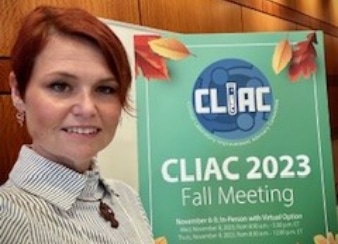“The work done by these groups has allowed CLIAC to make recommendations to modernize our regulations, which impact the laboratory community as a whole. We will see those impacts here at ECU Health,” Duncan said.
One of these regulations restricts who can train new personnel to perform certain functions in the laboratory. Thanks to Duncan’s work, regulations have now expanded to allow more people in the laboratory community to complete this training. “Because of such a labor shortage of laboratory technicians, this is having an impact by expanding the number of people who can provide training and improving the overall quality of laboratory testing,” Duncan said. Caryl Havasy, the laboratory services system administrator, sees Duncan’s work with CLIAC as instrumental in attracting more lab technicians. “ECU Health, like other health systems, faces a persistent shortage of laboratory testing personnel. Heather’s experience in laboratory operations and regulatory compliance in our rural-focused health system brings a much-needed perspective to CLIAC’s work, particularly its role in creating the regulatory structure that defines qualifications for frontline laboratory roles,” Havasy said.
Another interesting recommendation from the most recent CLIAC meeting would enable virtual skills acquisition, which would expand training capacity and integrate cutting-edge technology into practice. “Because we serve rural communities, having this technology would cover a large network,” Duncan explained. “We benefited from direct access to the work carried out by CLIAC. For example, our lab was one of the first beta testers of virtual lab safety training. They sent us four Oculus headsets and are offering us new training programs.
Although this technology is not yet widely used, Duncan said it is rewarding to be part of an organization that promotes technological advancements and makes recommendations at the federal level. “This work allows for a forward-thinking process and will impact our entire community,” she said. “Our vision is to be the national model for rural health care. We must therefore use all available tools. Being part of CLIAC means I have been able to make a real difference.
Havasy highlighted other areas where CLIAC and Duncan’s work with the committee is having an impact, including “a change to the rules surrounding histocompatibility testing (performed to match organ donors with recipients, c ‘i.e. kidney transplants) which will remove specific requirements for outdated methods and practices, accept newer testing techniques, and eliminate redundant requirements. This will result in a decreased compliance burden on the laboratory and more efficient testing for our kidney transplant patients in eastern North Carolina. Duncan also worked with the CoW working group, which addresses regulations for laboratories with a Certificate of Waiver. This waiver is granted to laboratories that only perform waived tests, which are simple laboratory procedures and tests with a low risk of an incorrect result (including urine pregnancy tests or blood glucose monitoring). Laboratories must pay a certification fee every two years to acquire and maintain the certificate. Duncan explained that one of the areas his task force focused on was updating the fee schedule. “CLIA is a self-funded program and they haven’t updated their fees in a long time,” Duncan explained. The group also worked to establish a broader range of penalties for laboratories that operate under a waiver certificate but fail to comply with CLIA regulations.
Because of its work with CLIAC, Duncan said ECU Health has a seat at the table and can contribute to advancements in laboratory operations. “Through these efforts,” Havasy added, “Heather embodies ECU Health’s vision of bringing the needs and potential solutions of our rural health system to the national stage, impacting not only our own operations, but also on those of each health system across the country.”


